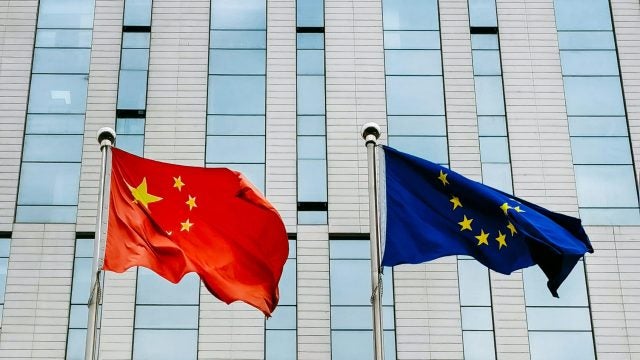Title: Japan and South Korea Can Lead Post-Pandemic East Asia
The COVID-19 pandemic has advanced two trends: the US-China confrontation and the increasing importance of soft power in the networked world. These developments present Japan and South Korea in particular—caught as they are between China and the United States—not only with serious challenges but also a grand opportunity.
The pandemic crisis has intensified the US-China confrontation. Partly due to the Trump administration’s persistence in calling COVID-19 the “Wuhan virus” or “China virus,” Americans’ negative view of China has risen from thirty-five percent in 2005 to sixty-six percent in 2020, according to the Pew Research Center. Unsurprisingly, the Trump administration is additionally reported to be planning an anti-China campaign to win the presidential election this fall.
Because of the rising anti-Chinese sentiment, Joe Biden is likely to be tough on China, too. An informal counselor to his election campaign advocates a Cold War framework between the United States and China, believing that such polarized competition could advance US capabilities. Such a framework would compel the United States to request that its allies decouple from China.
US pressure to divorce from China would torment Japan and South Korea the most. Neither Japan nor South Korea can hope to distance themselves from China because their mutual relationship is too important: they are geographic neighbors forever, they rely heavily on China economically, and they cannot peacefully settle the threat from North Korea without China’s positive engagement. At the same time, Japan and South Korea cannot leave their alliance with the United States either due to China’s uncertain intentions and rapidly advancing military ability.
A recent Washington Post editorial warned that US policies in response to the COVID-19 crisis have weakened its global leadership. Similarly, Stephen Phillips of the Financial Times declared that China is a ‘loser’ in the crisis because its authoritarian governance and intimidating diplomacy have further disillusioned many countries. With no change to their considerable military might, the United States and China have nonetheless seen their global influence and reputations reduced.
Conversely, the pandemic is empowering Japan and South Korea. While upsetting their respective peoples, the pandemic has also increased the overall global soft power of both. Harvard professor Joseph Nye, who defined soft power as the ability to attract others to shape their preferences, says that to deal with transnational issues like COVID-19, “it is not enough to think of power over others: one must also consider power with others.” He further asserts that “in a world of growing complexity, the most connected states are the most powerful.”
Several Asian countries, including South Korea, have increased their power by working successfully with others during this crisis. Their governments have effectively coped with the pandemic and have shared their policies of widespread testing (including drive-through), securing personal protection equipment for citizens, and using information technology to trace the infected. Due to these efforts, a recent article in Foreign Policy declared that the “Future is Asian but not Chinese”.
Signs of this can be seen in what the Association of Southeast Asian Nations (ASEAN) did in mid-April. According to Nikkei newspaper, China urged ASEAN to hold a joint video conference on COVID-19, perhaps to show off its massive support for the economic consortium. ASEAN, while agreeing to this, also asked Japan and South Korea to join them. The report stated that ASEAN still “trusts Japan highly,” but not China. Here, Japan and South Korea could take the lead in organizing an East Asian infectious disease prevention forum with ASEAN, then invite the United States and China. With their newly enhanced soft power, Japan and South Korea can now assume bigger roles such as this on the geopolitical stage.
Australian politician Andrew Haetie recently said that Australia “needs to build a coalition of like-minded nations” to solve global issues in the absence of world leadership. Joining such a coalition may sound attractive for Japan and South Korea; however, they need to keep in mind that the coalition should help both the United States and China rebuild positive leadership in the world, not replace them. Asia cannot be stable without their cooperation.
Professor Nye suggested the United States and China “form a binational high-level commission on COVID-19.” Amid the severe blame-game between these two, Japan and South Korea can seize the initiative to create a high-level four-nation commission on COVID-19, perhaps a permanent one that also includes the European Union.
In addition, Japan and South Korea could take a joint leadership role to corral the requisite nations to conclude the Regional Comprehensive Economic Partnership (RCEP) and to position this partnership as a focal point for the promotion of cooperation and stability in the Asia-Pacific. The RECP’s multilateral approach might also foster a smoother relationship between Japan and South Korea, allowing each to move beyond their bilateral trade relations. Similarly, a collaboration between the two nations could be beneficial in addressing the US demand to increase cost-sharing of US bases in each country. Japan and South Korea can create a joint working team to share information and to coordinate the response to the United States. A strategy designed with broader perspective, information, and knowledge is likely to foster a better collective outcome than each acting unilaterally.
But while Japan and South Korea have an opportunity to avoid a new Cold War by working together in this pandemic-altered world, their relationship is at one of its lowest points since 1945. Since the South Korean supreme court ordered in October of 2018 that Japanese companies must compensate Koreans who were forced into labor during World War II, tit-for-tat trade restrictions have followed, culminating in a security dispute. It has been reported that a Japan-South Korea-China health minister conference on COVID-19 has not yet been held because of the feud between Japan and South Korea.
Why should the two work together and not individually? Consider what happened when South Korea decided to terminate its security arrangement with Japan in 2019. China and Russia immediately sent warplanes to the disputed island between Japan and South Korea, heightening their feud, and North Korea raised tensions further by testing its short-range missiles that threaten South Korea and Japan. Furthermore, the United States was not willing to mediate the discord between these crucial allies.
China, Russia, North Korea, and the United States are worried about the multiplied influence Japan and South Korea would have if the two states collaborate. They know that the collaboration between Japan and South Korea would reduce their own relative influence in the region.
On March 1 this year, a day that in South Korea marks the birth of the independence movement against Japanese colonization, South Korean President Moon emphasized the importance of South Korea-Japan cooperation in overcoming the COVID-19 crisis. By accepting this wisdom, Japan, too, can demonstrate its soft power. Together they can help prevent a new Cold War and create a positive rise in the East.
. . .
Dr. Fumiko Sasaki is a faculty member of the School of International and Public Affairs (SIPA) at Columbia University and author of Nationalism, Political Realism and Democracy in Japan. An expert on East Asian security, Dr. Sasaki holds a Ph.D. and MA from the School of Advanced International Studies (SAIS) at Johns Hopkins University, where she is currently a visiting scholar at the Reischauer Center.
Recommended Articles

This article contends that South Africa’s 2025 G20 presidency presents a critical opening to shape governance of critical mineral supply chains, essential for renewable energy, digital economies, and national…

Germany’s economy is being throttled by a more competitive China that has usurped its previous manufacturing dominance in many industries. In response, Germany has doubled down on the China bet…

In 2021, the European Union (EU) attempted to assert itself in the Indo-Pacific arena to increase its geopolitical relevance by releasing an ambitious and multifaceted Indo-Pacific Strategy. However, findings from…